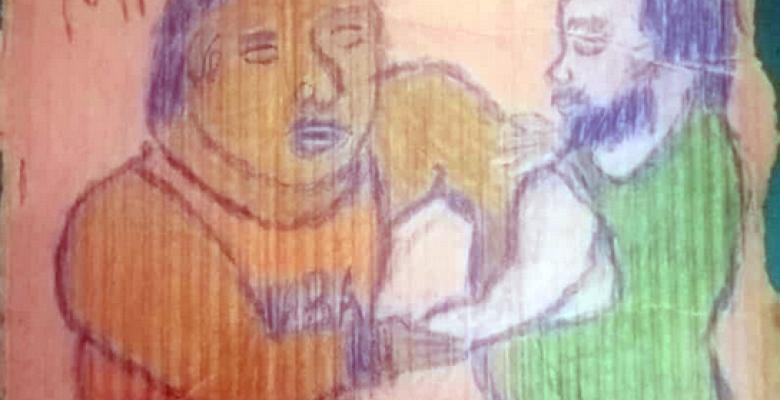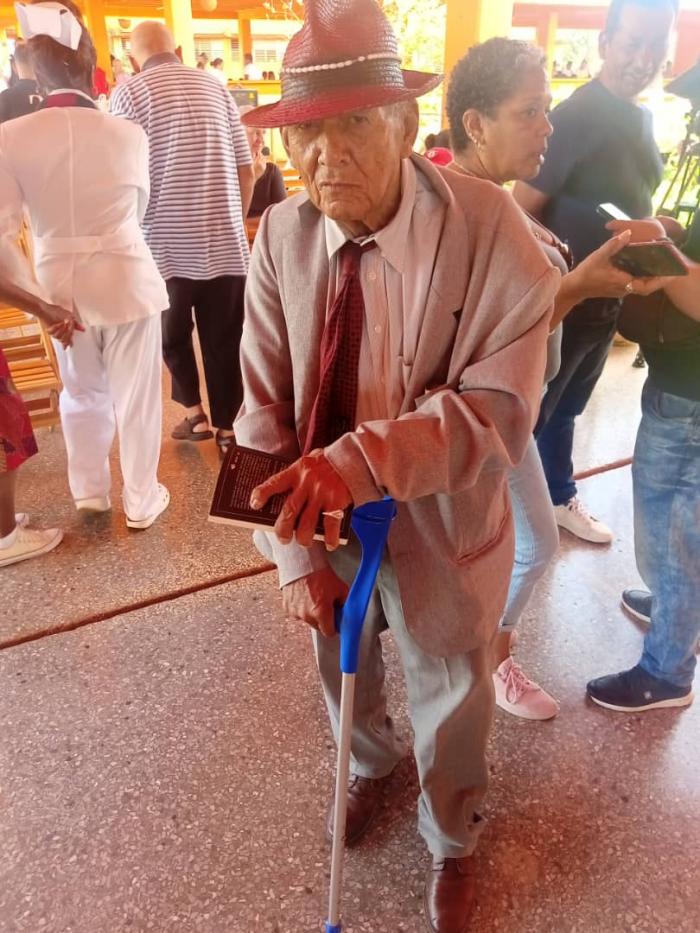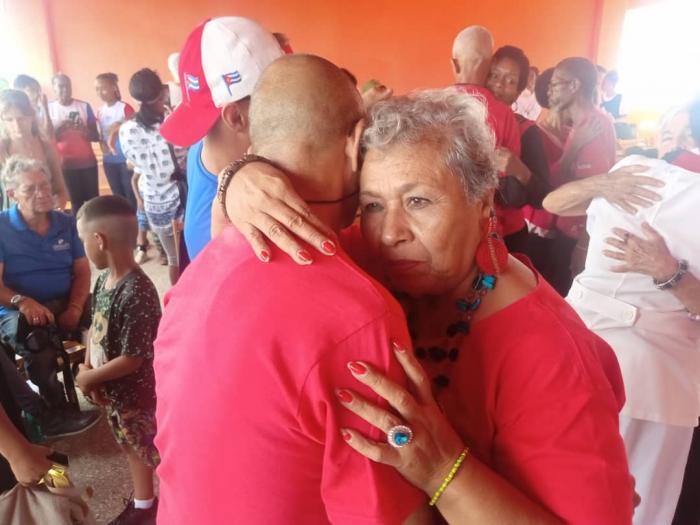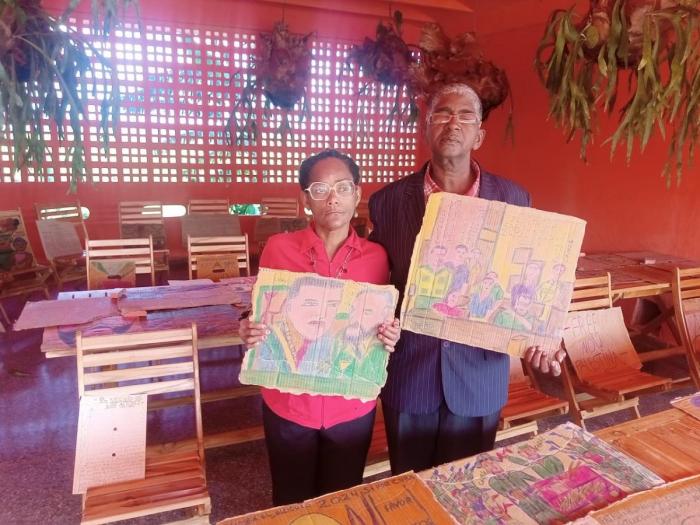OPINION: The Quisicuaba Cohabitants
especiales

How many stories do those faces conceal? Who are the ones from now, who were the ones from before? Artists and writers from the capital have come to act, sing or read poems. The sheltered people, upright, surprised, smiling, are new people, they have recovered their lost dignity. They have names and surnames, and they feel important. If you ask, they introduce themselves: "Miguel Ángel Borneaux Viltres", two names and two surnames, the walls of their fortress. An old man in a suit walks by, with his tie and his cane. He looks at me haughtily. I ask him to let me take a photo of him, and he poses, like a soap opera character. Sofia and Lian, the characters of the ongoing soap opera, Mirtha Lilia Pedro and Alejandro Guerrero, have also come, by the way, in real life. And the sheltered people take pictures with them. Or they with the sheltered people.

But the word is also new, strange, they are in a School in the Countryside, redesigned for other purposes. And they are the new residents. They bear sad stories, which I do not try to know: abandoned by their parents, who sold the house, or expelled by the daughter's husband, or by the implacable stepfather, lacking filial love, these beings once went unnoticed; they slept in a corner of the city, they ate the leftovers of any diner. They had lost even their name.
Some visited the soup kitchen in Centro Habana, where the Kardeciana Cruzada Quisicuaba Spiritist Association is based, which is presided over by a good man, Congressman Enrique Alemán. Up to four thousand daily rations of food are served there. They say that President Díaz-Canel told him: look for a School that is no longer in use in San Antonio, and we will support you. The home has a medical office that works 24 hours a day. Its cohabitants profess various religions, or none at all. There’s respect for everyone. When religious spirituality finds a space for realization in a context of revolutionary humanism, the work takes on greater dimensions.

Miguel Ángel and Ángela Figueroa Pérez met in that dining room in central Havana. He is 54 years old and she is 67, but he had been sleeping on the street for almost six years. She had only been sleeping for eight months. They seem to be the same age. There they were told about the shelter and they signed up. “I was desperate,” Ángela told me. They got married in the new home, she had her white wedding dress and her big cake, all paid for by the Association. They were given one of the small apartments for married couples in the building. When the music breaks out with the voice of Eduardo Sosa, the tres of Pancho Amat and the quena of Rodrigo Sosa, among other instruments, they dance very close together, as if not to lose each other.
Another couple is also dancing, but they are engaged: Natalie Juan Peña, 29, and Alexander Noel Padrón Vázquez, 40. They have a long history of being together, although for a while they stopped seeing each other and met again at home. They are, they explain to me, from Los Sitios and Cayo Hueso, respectively. Alexander is more talkative and lists a long list of people he wants to thank; she bottles inside her old pains. But her boyfriend gets romantic: “I’d like to tell her something, forever and for life, she is a pretty doll from head to toe, I don’t know how they put so much beauty in her face, plus her beautiful walk, just for a little kiss from her I would let myself die,” he says and smiles satisfied with his words.

The show is not only offered for the cohabitants of the home. Before that, a bus of children from a nearby school arrived, with their characteristic hubbub, their parents and teachers. There’s a group of diabetic children. Everyone sits on the floor to watch the magician, the contortionist and the woman with the rings, who are also part of this small crusade of artists. The actors of La Chinche Theatre Group make them laugh. The poets Virgilio López Lemus, Enrique Díaz and Alex Pausides have handed out some books and are introducing themselves. But in one of the hallways, in a cubicle, Olga María Villa Verrier, 47 years old, and Livan Heredia Borges, 55, another couple who got together in the home, wait for those who want to visit their painting exhibition. She draws, he colors afterwards. They don't have the knowledge, but in these works on cardboard they have found a meaning for life. Art saves. There are portraits of friends, of Fidel and Chávez, of Mijaín López; there are rural and urban landscapes; there are "compositions," as Livan calls them, texts written in large colored letters, sometimes with political content (against the blockade, for example), sometimes intimate, like poems in prose.
Standing by the exit stairs we take a last photo. Livan comes running and gives me a drawing in which Mijaín faces one of his opponents. On the back, in large letters, the name of Olga María, the author. She also gives me a cardboard with one of her compositions: “As night falls, I prepare to rest, in my useful, comfortable bed.” “My love, after a long day, I analyze, I meditate, what would the nights be like, my love, without your presence, without your caresses, without your breathing, without your warmth, without your legs on mine. If you were to be missing one day, it would be for me like a night without moon and without stars, it would be like the day the sun stopped shining on its faithful lover, Earth.” These men, these women, lived until yesterday on the street, they slept in doorways. Without friends, without family, without a name of their own. Sometimes we noticed them, sometimes we didn’t. They have been recovered with love and perseverance. Thanks to Dr. Alemán, to the Quisicuaba Association, to the humanism of each of the workers of this home, to the humanity rescued from the cohabitants. In any society there is solidarity, but in Cuba it’s crucial; humanism exists everywhere, but it’s the essence of a Revolution. That is Quisicuaba.
Translated by Amilkal Labañino / CubaSi Translation Staff













Add new comment